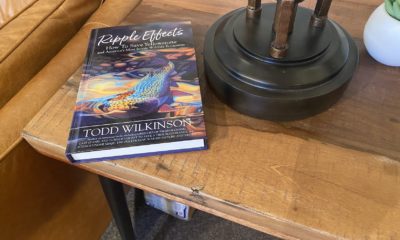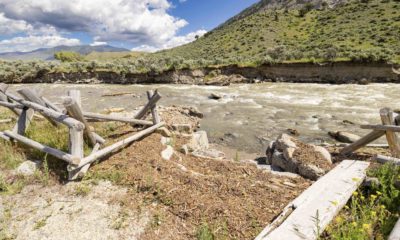Uncategorized
The New West: Has your ville come of age as a ‘Latte Town?’
Published
7 years agoon
Posted By
Outlaw PartnersIs your community a “Latte Town?” The thought of it even seems so passé. Of course it is. Even greasy spoon joints now serve espressos.
Two decades ago, political commentator David Brooks penned a wonderfully sneering piece for The Weekly Standard in which he created a new social category for certain lifestyle communities.
Like Frenchman Alexis de Tocqueville who cruised through America in the 19th century and shared his thoughts about what he thought of our nation’s crude, shallow culture, Brooks has a special fetish for traveling through the hinters of our great land identifying trends based upon patterns of conspicuous consumption that he believes translate into expressions of conservative or liberal ideals.
I’ll get to the punch line later, but in the meantime, read on:
“Latte Towns,” Brooks wrote in the latter half of the 1990s, “are upscale … communities, often in magnificent natural settings, often university-based, that have become the gestation centers for America’s new upscale culture.”
For those of you who drink your coffee on Sundays with a copy of The New York Times in hand, you already know that Brooks is a columnist for the old gray lady. He’s also a writer whose opinions put him in the company of guys like George Will, William F. Buckley and William Safire.
Yes, I’m speaking code.
Brooks also wrote a book, “Bobos in Paradise: The Upper Class and How They Got There,” an outgrowth of his Latte Town piece in the Standard in which he coins the term “bourgeois bohemians”—or Bobos if you will—to describe hoity-toity Patagonia- and Carhartt-wearing Americans who dress and act outdoorsy because it gives them cool cachet.
He followed that book up with another, “On Paradise Drive: How We Live Now (And Always Have) in the Future Tense.” In this treatise, he applies his insouciant baseball bat to the shallow consumptive impulses of the middle class.
Let it also be known that I have a personal bias when it comes to Brooks. I have great admiration for his work and the place he was trained. He and I both are alumni of the City News Bureau of Chicago, where we each reported on violent crime in the Windy City, though we were separated by a couple of years.
That said, let’s press on:
“You know you’re in a Latte Town,” Brooks observed, “when you can hop right off a bike path, browse in a used bookstore with shelves and shelves of tomes on Marxism the owner can no longer get rid of, and then drink coffee at a place with a punnish name … before sauntering through an African drum store or a feminist lingerie shop.”
Besides having “hip coffee shops,” Latte Towns, he adds, have gourmet bread stores, microbreweries, organic stores “and the rest of the sensibly-drenched enterprises that marry natural goodness, high craftsmanship, cosmopolitan taste, social concerns, and inflated prices to create genteel culture.”
What are a few of the other characteristics of towns oriented toward bean worship?
“If you walk into one of the many home-furnishing stores, you see that the Latte Town elite has transformed the old Protestant elite’s animal motifs,” he writes. “Artwork featuring hunting-related creatures like stags, hounds, and ducks is out; artwork featuring non-threatening animals like cats, frogs, and small birds is in. Cows, which are fashionably unglamorous and also pacifist, are quite chic.”
Does his synopsis match the artwork on your wall?
“Latte Towns,” he continues, “have developed their own sumptuary code, which is now spreading to all the places in America with high NPR listenerships. The code is based on a distinction between needs and wants. Needs are things we must have to survive, like shelter, food, clothing, and exercise. Wants are those things we desire to make us feel superior to others. The genius of the code of Financial Correctness that prevails in Latte Towns is that you can spend as much as you want on needs, so long as you are not ostentatious when you spend on wants.”
He cites examples: “You can shell out $50,000 on an in-home media center, because that is a mere want. You can drop $4,400 on a Merlin Extralite road bike at the local cycle shop, because man must exercise, but it would be vulgar to have a powerboat, because while man needs to move around, he doesn’t need motors to propel him.”
In Brooks’ mind, “the entire rural population of America can be divided between those who are Motor (powerboats, motorcycles, snowmobiles) and those who are Non-motor (canoes, mountain bikes, cross country skis). Latte Towns people are Non-motor.”
Does this perhaps explain the social schism that exists today between environmentalists and snowmobilers; between mountain bikers and ATVers; between those open to driving hybrids and those who peel around in Hummers just to piss you off?
Were the perfect Latte Town ever socially engineered, Brooks says, it would have “Rocky Mountain views to the west, redwood forests downtown around the town square, a New England lake along the waterfront, and a major city with a really good alternative weekly [newspaper] within a few hours’ drive.”
Sound like anyplace you know?
Here’s something else that distinguishes Latte Towns: Hippies and funhogs who descended there decades ago in order to drop out of the career rat race have ironically turned into some of the most ferocious capitalistic-minded entrepreneurs.
They’ve become rich by giving up ski bumdom for carpentry and, as contractors, building 8,000-square-foot trophy homes; they’ve become CEOs of backpack-making companies and now have wine cellars in their basements; they’ve sold off the sputtering VW van, secured their real estate licenses and now own an Escalade.
Yet to re-sanctify their commitment to land preservation and perhaps to sate their guilty conscience, they dutifully zip off a check for $25 to cover their annual membership in the most radical local environmental group.
Observes Brooks: “Maybe it’s not surprising that the 1960s-era rebels who once lived on communes named Walden, would, in the fullness of time, discover that business can be converted into a spiritually satisfying lifestyle.
“Business, which was once considered soul-destroying, can actually be quite enriching,” he adds. “[Latte Town inhabitants] were among those who made a crucial discovery, a discovery that is at the heart of the Latte Town success: They discovered that the anti-capitalist ethos of the 1960s can be converted into an efficient capitalist ethos for the 1990s and beyond.”
So here’s the point, the punch line of Brooks’ hypothesis, the de Tocquevillean coup de grace about many of the coffee-drinkin’ enclaves in the New West where a significant number of Americans are gravitating in droves.
Latte Towns, Brooks insists, are bastions not for naturally evolving Republicans, but for liberals, pragmatic leftists, do gooders and intellectual feel gooders who would seem to represent a progressive, well-heeled counter pole of the country club set.
Indeed, he is writing to entice.
According to Brooks, Latte Towns have distinguished themselves as “an interesting mixture of liberal social concern and paeloconservative effort to ward off encroaching modernism. Like the paleocons, the Latte Town elites seek to preserve old buildings and old communities and reduce the creative destruction of capitalism.”
Is your community a Latte Town? Chances are that if you’re reading these words wirelessly while leaning over a cup of steaming Chai or an exotic roasted brew, Brooks would argue yes and stir your froth with an exclamation mark.
Todd Wilkinson, founder of Mountain Journal (mountainjournal.org), is author of “Grizzlies of Pilgrim Creek” about famous Greater Yellowstone grizzly bear 399 featuring 150 photographs by Tom Mangelsen, available only at mangelsen.com/grizzly. His feature on the delisting of Greater Yellowstone grizzlies appears in the winter 2018 issue of Mountain Outlaw and is now on newsstands.
The Outlaw Partners is a creative marketing, media and events company based in Big Sky, Montana.


Upcoming Events
november, 2024
Event Type :
All
All
Arts
Education
Music
Other
Sports
Event Details
Spanish Classes with World Language InitiativeThese unique, no cost Spanish classes are made possible by the contribution of Yellowstone Club
more
Event Details
Spanish Classes with World Language InitiativeThese unique, no cost Spanish classes are made possible by the contribution of Yellowstone Club Community Foundation (YCCF) and Moonlight Community Foundation (MCF). This class will focus on building a lifelong affinity for world languages and cultures through dynamic and immersive Communicative Language teaching models.
Beginner Class – Mondays and Wednesdays from 5:30-6:30 pm
Intermediate Class – Mondays and Wednesdays from 6:45- 7:45 pm
- Classes begin Oct.7, 2024 and run for 6 weeks
- Class size is limited to 12 students
- Classes are held in Big Sky at the Big Sky Medical Center in the Community Room
For more information or to register follow the link below or at info@wlimt.org.
Time
October 21 (Monday) 5:30 pm - November 27 (Wednesday) 7:45 pm
Location
Big Sky Medical Center - Community Room (2nd Floor)
Big Sky Medical Center - Community Room (2nd Floor)
Event Details
Spanish Classes with World Language InitiativeThese unique, no cost Spanish classes are made possible by the contribution of Yellowstone Club
more
Event Details
Spanish Classes with World Language InitiativeThese unique, no cost Spanish classes are made possible by the contribution of Yellowstone Club Community Foundation (YCCF) and Moonlight Community Foundation (MCF). This class will focus on building a lifelong affinity for world languages and cultures through dynamic and immersive Communicative Language teaching models.
Beginner Class – Mondays and Wednesdays from 5:30-6:30 pm
Intermediate Class – Mondays and Wednesdays from 6:45- 7:45 pm
- Classes begin Oct.7, 2024 and run for 6 weeks
- Class size is limited to 12 students
- Classes are held in Big Sky at the Big Sky Medical Center in the Community Room
For more information or to register follow the link below or at info@wlimt.org.
Time
October 28 (Monday) 5:30 pm - December 4 (Wednesday) 7:45 pm
Location
Big Sky Medical Center - Community Room (2nd Floor)
Big Sky Medical Center - Community Room (2nd Floor)
Event Details
Spanish Classes with World Language InitiativeThese unique, no cost Spanish classes are made possible by the contribution of Yellowstone Club
more
Event Details
Spanish Classes with World Language InitiativeThese unique, no cost Spanish classes are made possible by the contribution of Yellowstone Club Community Foundation (YCCF) and Moonlight Community Foundation (MCF). This class will focus on building a lifelong affinity for world languages and cultures through dynamic and immersive Communicative Language teaching models.
Beginner Class – Mondays and Wednesdays from 5:30-6:30 pm
Intermediate Class – Mondays and Wednesdays from 6:45- 7:45 pm
- Classes begin Oct.7, 2024 and run for 6 weeks
- Class size is limited to 12 students
- Classes are held in Big Sky at the Big Sky Medical Center in the Community Room
For more information or to register follow the link below or at info@wlimt.org.
Time
November 4 (Monday) 5:30 pm - December 11 (Wednesday) 7:45 pm
Location
Big Sky Medical Center - Community Room (2nd Floor)
Big Sky Medical Center - Community Room (2nd Floor)










